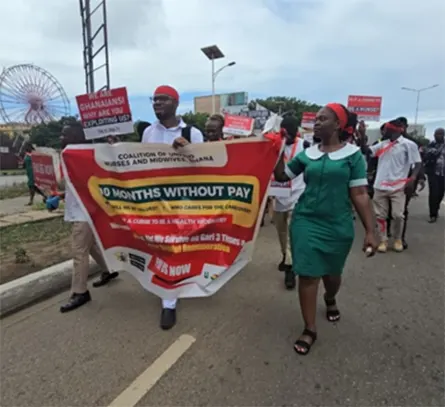Some of the protesting health workers
The Coalition of Unpaid Nurses and Midwives hit the streets of Accra yesterday in protest of government’s failure to pay the salaries of nearly 7,000 health workers, who have not been paid for the last ten months, despite being at post.
The aggrieved health workers began the demonstration from the Efua Sutherland Children’s Park and marched through some major streets in Accra to drum home their demands.
They gathered at the Ministry of Finance and the Ministry of Health, where they presented petitions to government officials, hoping to receive a favourable outcome in the coming days.
Some of the health workers carried placards with various inscriptions, including ‘We are Ghanaians! Why are you exploiting us’, ‘We survive on gari three times a day’, ‘Empty Promises, Empty Stomachs, MoF, MoH, Enough is Enough’, ‘We Can’t Survive on Promises’, among others.
Convenor of the group, Stephen Kwadwo Takyiah, who was visibly frustrated, described the government’s handling of the situation as unfair and unsustainable.
He said the group was not comfortable with staging a demonstration “but it has become necessary.”
“We are citizens, trained as professional nurses and midwives from nursing training colleges and universities,” he said.
Takyiah said the group is made up of those who graduated in 2020, completed their rotations, and waited at home for three years before being employed in 2024 after the Ministry of Health announced it had secured financial clearance from the Ministry of Finance to employ about 13,000 of them.
“But in April 2025, only some of our colleagues started receiving salaries. As we speak, just over 6,500 have been paid, while nearly 7,000 of us have worked for close to 10 months without pay,” he indicated.
He pointed out how the decision to withhold their salaries has had untold challenges on the members, urging government to act swiftly to intervene as a delay in the issue could affect healthcare delivery in the country.
“One of my colleagues just underwent surgery, and we are still struggling to pay her hospital bills. Another is an asthmatic patient who spends about GH¢300 every month on inhalers, buying them three times a month. Our people are suffering and some are dying, yet we have worked honestly,” he said.
Takyiah cited the words of President John Dramani Mahama at the recent UN General Assembly in New York, USA, and painted a rather gloomy picture of government treating them like modern-day slaves.
“The President said slave trade is the biggest crime against humanity. Today, I stand here to say this is modern-day slave trade. To deny citizens and health workers their salaries is the greatest crime any leader can commit. We are pleading with the government to act urgently—if not, we are dying, and our healthcare system is collapsing,” he said.
BY Gibril Abdul Razak


